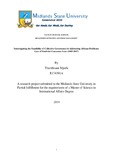Please use this identifier to cite or link to this item:
https://cris.library.msu.ac.zw//handle/11408/3685| Title: | Interrogating the feasibility of collective governance in addressing African problems: case of Ezulwini Consensus from (2005-2017) | Authors: | Mpofu, Thembisani | Keywords: | Collective governance African problems |
Issue Date: | 2018 | Publisher: | Midlands State University | Abstract: | This study focuses on collective governance in addressing African problems using the Ezulwini consensus as a case study of collective governance. Citing reasons for the call for United Nations Security Council (UNSC) reforms, examining the feasibility of collective governance in addressing African problems, discussing the role of the international community in helping Africa to achieve the Ezulwini consensus goal, evaluating challenges faced by collective governance or the Ezulwini consensus in addressing African problems. This study will mainly focus on the African problem of unequal representation in the UNSC where Africa does not have a permanent seat with veto power like other regions such as America, Europe and Asia. This problem resulted to collective governance in the form of the Ezulwini Consensus where most African states united and are calling for UNSC reforms so that Africa can be represented in the UNSC like other regions. The study also provides recommendations and solutions to the achievement of collective governance in addressing African problems hence in this case in achieving the Ezulwini consensus goal. To obtain primary data the study utilised in-depth interviews, questionnaires and a focus group discussion. The study mainly targeted government ministries and diplomats, scholars and political analysts, international organisations and MSU Politics and Public Management Students in acquiring primary data. This was further complemented by secondary data from an extensive relevant literature. The study used both qualitative and quantitative research methods and the data gathered from the field was also presented by the use of tables, charts and graphs. The information gathered showed that national interests, dependency syndrome, external influence, veto power and colonial legacies only to mention but a few are some of the major challenges of collective governance in addressing African problems. The study concludes by giving recommendations to collective governance or the AU to be specific in addressing African problems and how to achieve the Ezulwini consensus goal. | URI: | http://hdl.handle.net/11408/3685 |
| Appears in Collections: | Master of Science in International Affairs Degree |
Files in This Item:
| File | Description | Size | Format | |
|---|---|---|---|---|
| mhofu FINAL.pdf | Full Text | 1.16 MB | Adobe PDF |  View/Open |
Page view(s)
80
checked on Feb 26, 2025
Download(s)
48
checked on Feb 26, 2025
Google ScholarTM
Check
Items in MSUIR are protected by copyright, with all rights reserved, unless otherwise indicated.


